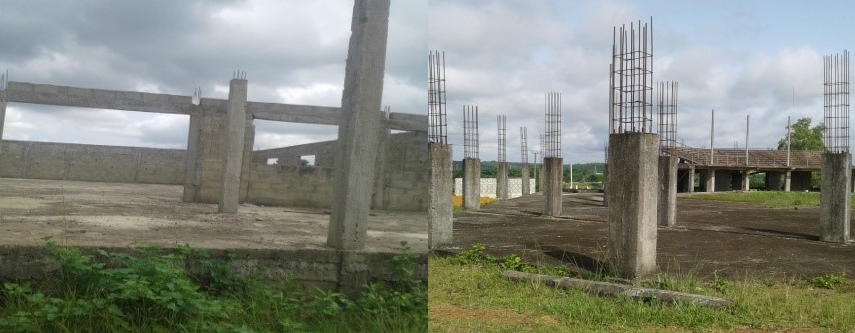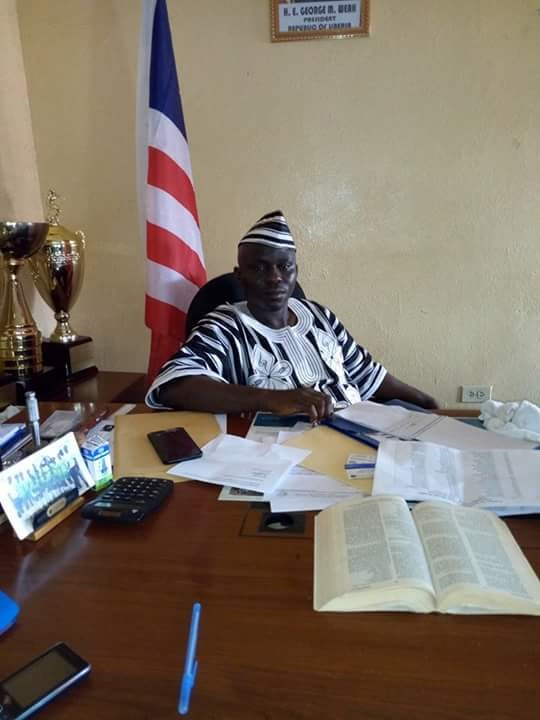KAKATA, Margibi – Some citizens in Margibi are outraged about the slow pace at county officials are moving to use the US$2.7 million approved under the County and Social Development Fund in 2011 and 2013 to implement development projects.
The funds were intended to rehabilitate streets in Kakata, expand a school, and build two town halls and a multi-purpose center at the Booker Washington Institute.
A report from the General Auditing Commission said that the county approved 12 projects during the 2011 and 2013 fiscal years, but only 10 were targeted. According to the report conducted in September 2013, only four of the ten projects were completed; two were abandoned and four are unfinished. The audit showed that the county spent US$1.2 million of the US$2.7 million to implement the ten projects.
Superintendent Jerry Varnie, who took over the leadership of the county on March 16 this year, said the county’s debt burden is responsible for the slow pace of implementing projects approved and funded in fiscal years 2011 and 2013.
Varnie said the county did not disburse nearly 90 percent of the funds allocated for the projects to contractors. BWI and several other projects were not mentioned in the reports, Varnie said. The center was designed to include an auditorium, cafeteria, dormitory basketball court, and conference hall and office space.
According to GAC reports, four companies were contracted to work on seven projects in Margibi. They are Modern Agriculture and Construction Engineering Company, MDMC Express Inc., and New Millennium Investment and City Contractors. Efforts to reach the companies via phone calls and social media platforms were unsuccessful.
On Jan. 8, 2014, the GAC wrote the Liberia Business Registry requesting the status of the companies during fiscal years 2011-2013. The Liberia Business Registry responded two days later, stating that the New Millennium Investment Company, Inc. and the MDMC Express Inc., were not registered during the period under review. Under procurement laws, only legally registered businesses are to be awarded public contracts.
Varnie said the documents turned over to him by his predecessor John Buway does not include any information on the BWI multi-purpose center. He plans to investigate how his predecessors managed project funds. Buway could not be reached via phone and did not respond to a text message.
“It will surprise you to know that the BWI project was not included in the documents that were turned over to us,†Varnie said. “And there are many other projects that we discovered that are not in the turnover notes.â€
The multi-purpose center at BWI was budgeted at US$487,000 in November 2011 under the leadership of former Superintendent Levi Piah. Buway served as assistant superintendent for development and later served as superintendent from 2012 to March 2018, when he was replaced by Varnie.
The BWI contract was awarded to Modern Agriculture and Construction Engineering Company, according to the GAC. The contractor received US$115,000 to begin the first phase of the project, but GAC only found a voucher for US$28,970 dated December 4, 2012.
The voucher and receipt for the payment indicated that the amount represented the final stage of the project. Documents including payment vouchers, returned checks, and receipts for the remaining US$86,030 were not provided, according to the GAC report. There was no evidence of a bid evaluation report and certificate of completion.
Construction began in November 2011, but the work was not completed. The site includes one enclosed building with a roof surrounded by four concrete columns.
Jimmy Zinnah, special assistant to the BWI’s president Harris F. Tarnue, said BWI does not know why the project stalled. The administration plans to lobby current lawmakers to intervene, he said.
“Since the ascendancy of our administration in 2015 we have not received any documents [about the project],†Zinnah said. “There is no record to show what the contract entails, including sketch of the project. An abandoned project at the entrance is not a good reflection of the campus.â€
In Unification Town, Acting Mayor Esther Kiawood said it is a shame that the town does not have a town hall as was proposed for funding in 2011. Kiawood said she has been asking about the status of the town hall since she took over about a year ago.
“It is embarrassing that a whole town does not have a town hall,†she said. “If we are having a meeting, we sometimes pay US$100 to the use the people’s church. Sometimes I use my office space, which is not even big.â€
Construction on the Unification Town Hall began on October 17, 2011, but the building has no roof, doors and windows. The building is sinking in muddy waters, surrounded by overgrown grass.
In January, Kiawood said she asked the development superintendent about the status of the town hall, and he promised that it would be completed.
“Every time I ask about the abandoned town hall, they don’t tell me anything concrete,†she said. “Now the building is sinking and all they say is, ‘they will complete it.’â€
The unregistered New Millennium Investment was awarded a US$114,500 contract to build the town hall in Unification Town and Dolo Town, but only the Dolo Town hall was completed.
Kakata residents were looking forward to new streets, but more than six years after work began in December 2012, citizens are still walking through muddy waters during the rainy season. Of the US$2.7 million, US$1.0 million was allotted for the streets.Â
According to the GAC report, the street rehabilitation contract was awarded to Modern Development and Management Corporation Express Inc. for US$1,047, 426.18. According to the agreement, the road work was supposed to be completed in eight months.
The GAC report said the contractor received an initial payment of US$314,227.85 for the work. The payment was supposed to be done in four installments, but there is no indication that the company received additional funds.
“When the ambulance picks up a patient, cars usually slow down in order to dodge the potholes,†said Princess Thomas, a resident of Kakata.
Binda Kollie, another resident shared similar sentiments about the road conditions.
“When the rain comes, the whole road can be blocked; no way to pass,†Kollie said. “Every day they say they [are] fixing the road; the road can’t be fixed.â€
The current state of the streets in Kakata does not match what was allocated for the project, and citizens are wondering what happened to the money.
The other unfinished projects include a town hall in Cotton Tree and the expansion of the Lippaye Elementary and Junior High School. The construction started, but there are no doors, bathroom and the buildings remain unpainted.
Justin Barmen, outgoing chair of the Project Management Committee that approves County and Social Development Fund projects, refused to comment because he’s no longer managing projects. The county has not appointed a new PMC chair and Margibi has not had a county sitting to approve new projects since 2013.
During the period under review, Margibi received US$75,000.00 in CSDF money from China Union, the company which in 2008 signed a Mineral Development Agreement with the government of Liberia to take over Bong Mining Company concession in Bong and Margibi.
China Union stalled its operations in 2014 because of the drop in prices of iron ore on the world market. Under the agreement with the government, China Union was required to pay US$3.5 million annually for operations in the two counties for extracted resources.
Superintendent Varnie said he inherited a county with empty coffers and US$60,000 in debt owed to banks, a problem that hinders development in the county. He plans to conduct an audit on how his predecessors spent county funds.
“We discovered that some of these projects were abandoned because the county owes the contractors almost 90-95 percent of their money [allocated for the project],†he said. “With this kind of liability, it will be difficult for this administration to undertake new projects because we can’t leave the [existing projects] undone.’’
Varnie said he needs some clarity on what happened to the funds: “Basically, we took over a very empty and broken coffer.â€
Matthew Zeon, a field-based monitoring consultant for the civil society group Citizens United to Promote Peace and Democracy in Liberia, said the situation in Margibi is symptomatic of the problems facing CSDF projects nationwide. CSDF projects, he said, are poorly managed and there is no transparency and accountability.
Zeon’s agency is one of eight civil society organizations that is part of a USAID Liberia Accountability Voice Initiative National Resource Management coalition that seeks to engage citizens in the management, accountability and governance of CSDF projects.
In Margibi, Zeon said, county officials marginalized the District Development Council, a citizens-driven stakeholders’ group that worked with officials to identify CSDF projects and provide oversight in a given district. The DDC has since been dissolved and decisions regarding CSDF projects are made entirely by county officials. It is disheartening, Zeon said, that Margibi has not had a county sitting in the last five years.
Past administrations, he said, mismanaged the CSDF, leaving many projects abandoned and unfinished. He called for the revitalization of the DDC to empower and give citizens more control over how CSDF money is spent.
“Citizens need to hold government accountable,†Zeon said.
This article was produced with support from the Center for Accountability and Transparency International under a project aimed at engaging citizens, the media and government stakeholders on the national budget and County and Social Development Fund.




